In China's war on Uighur women, nothing is sacred, everything is permitted
Gulmira froze. Her husband was away on business and for the third night running her inebriated Han Chinese male so-called "relatives" were demanding that she fetch her girls to dance for them.
Five of them had wolfed down the meal she had prepared. They were smoking and drinking and calling for their evening's entertainment. The house was filled with a suffocating fug.
My friend had no choice but to laughingly agree to their request. She knew the penalties too well for those who failed to enthusiastically embrace the CCP "pair up and be family" policy, where one million Communist Party cadres have been billeted with Uighur families, ostensibly as a cultural exchange.
Comply or disappear, that is the subliminal deal.
The whole evening had been excruciating. Forcing herself to smile at their lewd jokes and flirtatiously fending off their wandering hands, she wished it would end and she could join her daughters. But it was not to be.
She turned on the music, dressed them in national clothes, and bade them dance. Uproarious clapping and laughter accompanied the show as her little ones shyly performed their simple act. They kept a brave face, good-naturedly putting up with the agony and mockery of their culture.
At last it was over. Gulmira made some excuse about having to help them with their Chinese homework and they all fled upstairs. She locked and barred the door, but barely slept a wink.
Every creak on the stairs made her start. So far she had been spared what friends told her had happened to them. Perhaps because she was married and the girls were small. She did not know. But she was immensely grateful. Only two more days to bear the humiliation and that would be it for another month. If they all escaped with their honour intact, that would be enough for her.
 |
If they all escaped with their honour intact, that would be enough for her |  |
By marking special days for women and calling out perpetrators of sexual violence, the world agrees that what happens to my Uighur friend and millions like her every month, should never happen.
But the annual International Day for the Elimination of Violence against women on November 25, and the so-called International Women's Day on March 8 are a luxury for those confined to Xinjiang at this critical juncture when the very cultural and existential survival of the Uighur race is at stake.
The international community, for all its posturing and outrage, has been unable to change anything for Gulmira who with countless unsung women and girls, are at this very moment enduring unspeakable cruelties in internment camps, subject to draconian sterilisation procedures, rape and sexual violence amid the acculturation "pairing up" experiment, and suffering the ultimate loss; that of their own children forcibly removed into State-run institutions.
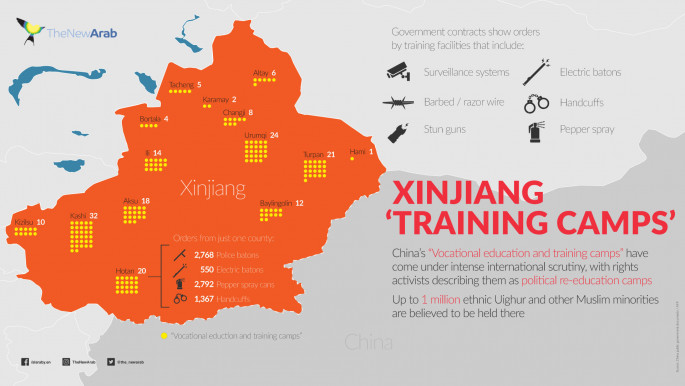 |
|
 |
Gulmira who with countless unsung women and girls, are at this very moment enduring unspeakable cruelties in internment camps, subject to draconian sterilisation procedures, rape and sexual violence amid the acculturation "pairing up" experiment, and suffering the ultimate loss; that of their own children forcibly removed into State-run institutions |  |
To highlight the plight of women in Xinjiang, and to appeal to the world for action to stop the madness, a group of UK human rights lawyers, The Rights Practice, have published a landmark report, the first of its kind on this subject, to spotlight the illegal and indefensible catalogue of human rights abuses being meted out to women under the current regime.
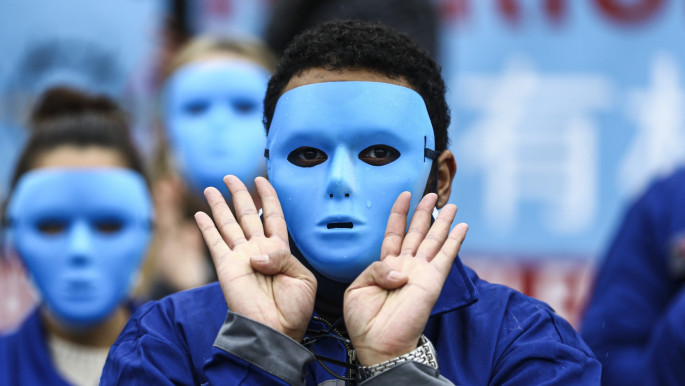 |
|
| Read also: Why the Uighur genocide in China matters |
Invisible Pain, sexual and gender-based violence in Xinjiang outlines the particular vulnerabilities of Turkic women in China's North West and puts the spotlight on their unique vulnerability amid Xi Jinping's invisible war on terror.
The report explores the context of the atrocities in Xinjiang against the background of an across the board deterioration in respect for human rights generally in China.
Fifty UN independent human rights fact finding experts drew attention to this at a June 2020 meeting of the Office of the UN High Commissioner for Human Rights (UN OHCHR) and flagged up widespread arbitrary detention, deterioration in religious expression and belief, lack of civil society, and an unaccountable legal framework.
China, whilst being a signatory, only pays lip service to the various UN human rights treaties that champion women, minorities, rule of law, and ban torture and inhuman and degrading treatment.
Uighurs, despite being an integral part of China's much vaunted 56 ethnic groups, could not be less like the majority Han Chinese. And this is where they fall foul of Xi Jinping's mass sinicization drive, whose aim is to bring everyone and every group under the Chinese Communist Party's atheist and Chinese nationalist banner.
They are a Turkic race, having more in common with the Central Asian and Turkish people on the other side of the mountains.
They are largely Muslim, eschew pork, value modesty and enjoy a traditional way of life which tends to delineate male and female roles in society.
 |
China only pays lip service to the various UN human rights treaties that champion women, minorities, rule of law, and ban torture and inhuman and degrading treatment |  |
Uighur women are seen as the guardians of Uighur culture, its transmission to the next generation, its religious mores and way of life.
The 2011 CCP, Han-centric "Project Beauty" push, swept Uighur culture, the wearing of veils and ankle length ethnic clothing aside, promoting a "modern woman" ideal of mini skirts, short or long loose hair and make up.
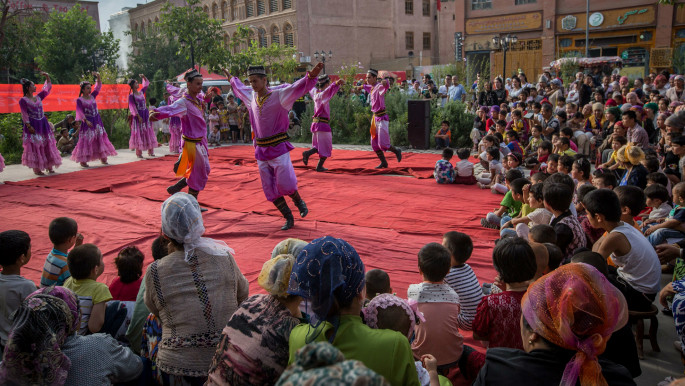 |
|
| Read also: Welcome to Kashgar! Where you can sip tea and watch Uighurs be persecuted |
Uighur women were drafted in to sit, red-arm-banded at street corners in Kashgar to put a stop to their own who flouted the new regime.
Timothy Grose, professor of China Studies at Rose-Hulman Institute of Technology, in his Westminster University blog describes a large scale roll out of beauty pageants and salons throughout the south of the province to promote a modern and largely Han idea of beauty.
He quotes an official from the Xinjiang Women's Federation praising the effects of the scheme in changing women from the outside, in.
"The Beauty Parlour and Hair Salon initiative will bring forth three transformations in the lives of women. First, women will transform their body image. Then, they will transform their way of life. Finally, they will transform their way of thinking," it announced triumphantly.
"The Party is inscribing 'modernity' and urban beauty on cosmetics, permed hair, and casual dress, thus normalising these practices, while it is identifying pious and Turkic standards of beauty as deviant," he notes.
The Rights Practice report quotes a poverty alleviation initiative whereby women work in satellite factories near their villages and are praised on a government website for no longer wearing headscarves as was their previous habit.
"Instead they wear work clothes, hats and square kerchiefs. And the change is more than just skin deep," it says jubilantly.
But the side swipe on Uighur values and femininity takes a far more sinister turn when Xi Jinping's softly softly approach to assimilation becomes a crushing yoke in 2016, under Chen Quanguo, who arrived to govern the province fresh from quelling dissent in Tibet.
 |
Under the guise of quashing the War on Terror at home, hundreds of thousands of Uighurs began to disappear |  |
Under the guise of quashing the War on Terror at home, hundreds of thousands of Uighurs began to disappear. They were drafted into so-called "re-education" aka internment camps, many were sentenced extra legally to draconian prison terms, torture was widespread and for those on the outside, the entire province became a surveillance state.
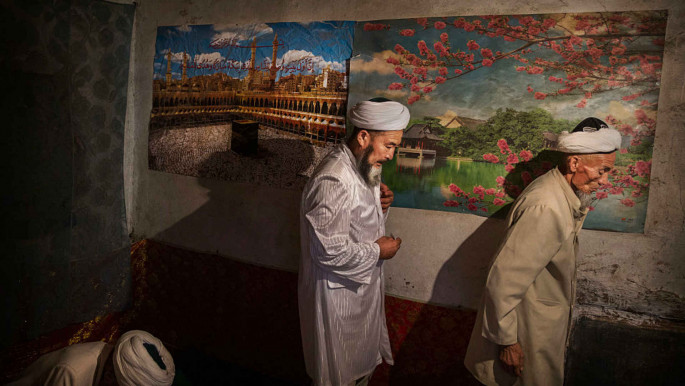 |
|
| Read also: China's Uighur oppression runs deeper than Islamophobia |
The report is concerned for the welfare of women under a regime which sees Uighur Muslims and their way of life as an existential threat.
"Combined with a political willingness to use detention, without due process, in unregulated, extralegal facilities have amplified the risks of violence for women already marginalised in society by their religion and their ethnicity."
Despite the fact that only just over a quarter of the documented cases of detention registered in the Xinjiang Victims Database are women, the fall out of draconian government policies under Xi's "New Era" extends to every area of women's lives.
Women who escape the net of the camps bear the brunt of the disappearance of the male members of their households, often for indeterminate periods of time.
The social order is disrupted. Not only do they have to run the home, tend their land, care for the children and become the sole breadwinner, they also have to fend off unwanted attentions during monthly visits of government cadres, sent to spy on them, eat with them, and even sleep with them.
Given that the aim of government policy is to neutralise Uyghur religion and culture, it appears from witness accounts that there is no accountability or legal framework to protect victims.
Neither the camps or any other policy in line with the CCP's stated goals offer protection against human rights violators or abusers of the system.
"The detentions are arbitrary under international law: there is no legal basis, no right to a fair trial and the deprivation of liberty is based on discrimination and the exercise of fundamental freedoms, including freedom of religion or belief," says the report.
It adds, "Detention in these camps is also illegal under China;s own laws on the deprivation of liberty. These camps fall outside China's own criminal justice system placing all detainees at a high risk of torture and ill treatment," flagging up the absence of independent external monitoring of detention facilities in China.
It is not known whether sexual violence perpetrated against women in the camps is official policy, or simply used at the whim of camp directors as a humiliating tactic.
 |
She saw deaths, disappearances, and girls taken from lessons to be gang raped by Han Chinese managers of her camp |  |
When I interviewed Qelbinur Sidik, the former internment camp teacher, after she took refuge in Europe, she told me that the sexual attacks she heard about in her camps were random, appeared gratuitous, and were never spoken about.
She saw deaths, disappearances, and girls taken from lessons to be gang raped by Han Chinese managers of her camp. "We knew that if anyone complained, or reported what we saw happen to the girls, we would be the next to go," she told me.
Subsequent and more recent accounts of other women who have either been victims of or witnessed cruelty against women in the camps have been shocking given the widespread and systematic nature of the abuse.
The Rights Practice report goes on to say that in law, rape in detention is torture, and that in conflict situations it has been part of a deliberate strategy to undermine community bonds, weaken resistance, and perpetrate ethnic cleansing.
"Rape and sexual violence in the XUAR camps are highly likely to be under-reported," it maintains, given the "unlimited power of the police in the unregulated detention facilities."
Given that camps are locally run, the nature of the regime is likely to vary in relation to staffing, management and local political factors.
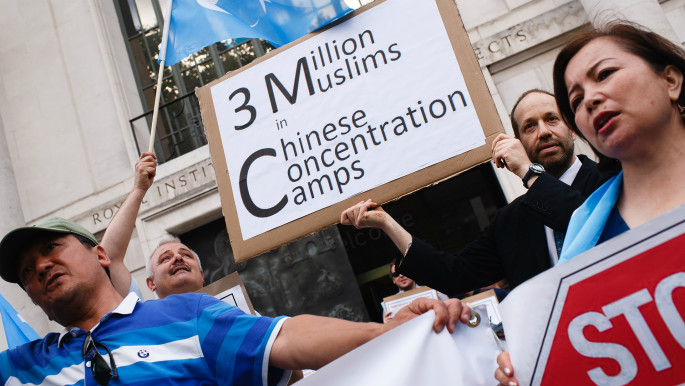 |
|
| Read also: Why Muslim countries are turning their back on China's repressed Uighurs |
The absence of supervision or external monitoring means there is no recourse under law for women who are raped to complain. The report highlights the fact that, "even the most courageous ‘rights defence’ lawyer in China would feel unable to bring a case alleging abuse," pointing out that the "political sensitivity of the situation in Xinjiang exacerbates existing censorship of mainstream and social media to silence any public discussion in China of the camps and allegations of rape."
Mass sterilisation of Uighur women has been the latest scandal to come out of Xinjiang following meticulous trawling through open source Chinese government websites by researcher Adrian Zenz.
His analysis of the Karakax files, which give a detailed run down of the profiles, "crimes" and sentencing of individuals in the Hotan area of Southern Xinjiang, showed that the most common reason for the incarceration of women was giving birth to excessive numbers of children.
His latest findings prove there is a systematic policy to reduce the population growth in some parts of Xinjiang to zero within the next few years.
He discovered that in 2018, 80 per cent of all IUD placements in China took place in Xinjiang, despite the region representing only 1.8 percent of China's population.
Testimonies from camp survivors abound of forceable medicating with pills and injections. Qelbinur Sidik watched girls line up for their regular pills and could never discover the reason. She was told they were calcium, but remembers asking herself "why so much calcium?"
Many girls' periods stopped, according to witnesses. Others experienced impaired cognitive function.
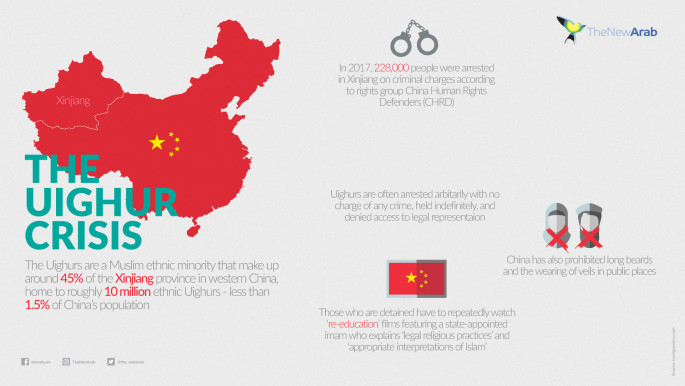 |
|
 |
Many girls' periods stopped, according to witnesses. Others experienced impaired cognitive function |  |
Elderly women are not exempt from the roundups either. Only recently I interviewed a Uighur exile in Turkey, Abdurahman Memet, whose 61-year-old mother was taken because she failed to persuade him to return to their village. Qelbinur herself taught a class in which there were six elderly women.
China’s eighth amendment to the criminal law recommends mitigated punishment for those aged 75 or older, states the report, but "with the camps operating outside the criminal justice system in China, such guidance is unlikely to apply."
There are also no procedures that ensure all deaths in any form of custody are independently investigated.
Left behind in the villages when younger family members are taken into detention or forced into factory labour, older women are also likely to suffer from the additional burdens of childcare and agricultural work.
Where there is no one left to care for the children, the scandal of a huge network of State orphanages has yet to be fully plumbed.
Children, abandoned following the detention of both parents, are severed from their roots, their language, culture and their religion, and brought up by a State that exercises total control over their futures.
As more crimes come to light, and more witnesses step forward with their evidence, the extent of the crimes against humanity perpetuated against not only the Uighur men, but their womenfolk, are beginning to see the light of day.
The report details efforts made in the past year to bring these atrocities to international attention and to detail the international laws that are being broken.
The Asia Pacific Centre for Responsibility to Protect has concluded that the evidence they have analysed "likely meets the requirements of the following crimes against humanity: persecution, imprisonment, enforced disappearance, torture, forced sterilisation and enslavement.
They also conclude that it is arguable that genocidal acts have occurred in Xinjiang, in particular imposing measures to prevent births and forcible transfers."
The Rights Practice report condemns the impunity of Chinese public officials which it says, "undermines all claims that the country respects human rights."
According to the report, Uighurs and other victims of rights violations are left with no hope of remedy from Chinese institutions, and the backdrop of a global war on terror behind which Beijing has hid to justify its, at the very least cultural genocidal policies, have also "trumped respect for human rights."
"China continues to justify its actions in Xinjiang as measures to counter terrorism and ‘religious extremism’," it concludes.
The report calls for concrete measures by world governments to call China out for its actions against the Uighurs, and for the UN to hold Beijing accountable.
It calls on women’s' movements around the world to be an ally, particularly those in Muslim states which to date have only offered grudging support.
 |
Sexually violating women, including stopping them from reproducing, has become a weapon for China against its Muslim population |  |
"Sexually violating women, including stopping them from reproducing, has become a weapon for China against its Muslim population," said Kazakh lawyer, Aiman Umarova.
As witnesses to the atrocities have testified, none of the women imprisoned in the gulags, or in what has become the open prison of Xinjiang, are able to speak up for themselves. The report is calling on the international community to speak up for these women.
I know that if they did, my friend Gulmira would be so grateful.





 Follow the Middle East's top stories in English at The New Arab on Google News
Follow the Middle East's top stories in English at The New Arab on Google News


